Information for the expats from India
|
 |
The Netherlands is a country rich with history, culture, and landscape. Despite
modernization, the Dutch are also very traditional people, proud of their heritage.
It is useful to respect their customs, traditions and cultural heritage. The Dutch
are friendly and helpful. In India you might have had the idyllic picture of tulips,
windmills, cheese and wooden shoes. And then there is also image of the Netherlands
as the land of drugs and the red light districts. Both of these images co-exist
peacefully in the Dutch domestic scene. The Dutch are also very adventurous people
being the first to land on shores of many countries, even before the British. The
Dutch are also a pragmatic people.
The foundation of the Dutch social structure is the family. However, the structure
and longevity of Family have been under constant change. At present a typical Dutch
family is a nuclear family with husband, wife and children. The definition of marriage
has also undergone major changes, and presently it means also “living together” without
a formal marriage. It also means living together with a partner of the same sex. They
can officially get married and adopt a child. Dutch law recognizes such family structures.
Families tend to be small, often with only one or two children. The Dutch consider
themselves as practical, well-organised, hardworking and thrifty. They are disciplined,
conservative, and pay attention to the smallest details. The Dutch place high value on
cleanliness, neatness and straightforward.
The Dutch are very private people and do not draw attention to themselves. Individual
freedom of each and every citizen is highly appreciated and protected. People are
allowed to behave and express themselves whichever way they like; so long as it does
not intrude on anyone else’s freedom. Tolerance for individual differences is regarded
a must in Dutch society. But lately there is a change taking place in this. The
Netherlands is now considered politically around the world as conservatives due to
the rise of the right wing parties and incidents of lack of tolerance against Muslim
immigrants. Right-wing extremism is no longer a marginal phenomenon in the Netherlands.
There are political parties represented in the local and national legislatures with
strong nationalist sentiments, belonging to the extreme rightwing political family,
which combine nationalism, racism and xenophobia. Although the main stream politics is
still based on a centrist view inclining some times little bit towards left and sometimes
to the right. However, a rising rightward swing cannot be denied.
Generally the Dutch do not display their wealth and boast about their accomplishments.
This is against their egalitarian beliefs in which everyone is considered valuable and
worthy of respect. “Doe gewoon” (do as everybody) or “doe normal” (act normal) are the
basic rules of personal conduct of the Dutch society. "Doe nou maar gewoon, dan doe je
gek genoeg": Just act normal, that's crazy enough is an expression often used to remind
others to conform to general norm. "Status and respect are obtained through studies and
hard work rather than through family ties and old age.
Though individual input and suggestions are valued, the Dutch place a high value on
consensus. Nevertheless, the boss is the final decision maker. The typically Dutch
‘polder model', whereby employers, trade unions and governmental authorities meet and
negotiate until they arrive at a consensus is the Dutch version of consensus policy
strategy of 'cooperation despite differences'. Both in government and in business,
the need for consensus leads to rather slow decision making and lengthy negotiations
since input from everyone must be considered.
The direct and straightforward Dutch way of communication might surprise some of the
Indians. They do not like to beat about the bush and prefer to come directly to the point.
They are very clear and extremely direct in their comments and reactions. The directness
implies openness and clarity between people and avoids confusion. They may sound blunt
to people exposed to the Indian culture where communication is more indirect and context
driven. The Dutch prefer relying on hard facts and figures rather than emotions and
instincts.
Despite many positive qualities, sometimes others see the Dutch through a different angle.
There are many derogatory sayings starting with Dutch. For example: Dutch uncle, Dutch
courage, Dutch auction, going Dutch, double Dutch, Dutch cap, Dutch bargain, Dutch treat,
Dutch dinner, etc. Mostly, these are used as humour and not an insult as many sayings
by British against Irish and the other way round or the Dutch sayings against Belgians
and the other way round.
In the course of time a new immigrant comes to know more about the social norms of action
and behavior in the Netherlands. But, here are a few do’s and don’ts of the Dutch society.
|
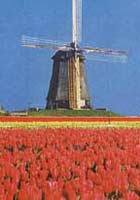 |
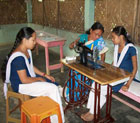 |
- Casual wear is widely acceptable. Men are expected to wear a suit for
business and social functions. Formal wear may be required for smart restaurants,
bars and clubs. Evening dress (black tie for men) is generally specified on
invitation. Ties are beginning to be worn less, after the late Prince Claus of the
Netherlands took his tie off and declared that it was, "A snake around my neck!"
Normally, in winter Dutch wear “layer clothing” of 3 garments one on the top of
other and when not needed take it out.
|
 |
- The Dutch like to be punctual in all situations. It is important that you
arrive on time. Do not arrive early, either. Please call your host if you expect
to be more than ten minutes late. If you are invited to a Dutch person's home,
it is customary to take a small gift such as chocolate, a plant, flowers, or a
book. Gifts should be wrapped nicely. Avoid white lilies, because those are
generally for funerals. Gifts are usually opened when received.
- In sitting position, loosen all of your suit buttons (single breast suit)
and leave one button attached (double breast suit). If you stand-up or walk,
attach all your buttons. This also applies when you are introduced to another
person and you have to stand up to greet him/her.
- If you are invited for a dinner the table manners are Continental – while
eating the fork is held in the left hand and the knife in the right. Remain
standing until invited to sit down. You may be shown to a particular seat.
Men generally remain standing until all the women have taken their seats.
- Wait until everyone has been seated before unfolding your napkin
and placing it on your lap.
- Remember, your water glass is on your right and your bread and butter
plate is on your left. If someone uses your bread and butter plate, don’t
correct him or her; just place your bread on your dinner plate.
- Silverware is placed in order and should be used from outside to inside.
When in doubt, watch the host/hostess and follow their lead. The napkin
should remain in your lap until you have finished the entire meal. Never
place it on the plate or on your seat. Taste the food before you add salt
or pepper out of courtesy for the chef.
- Do not begin eating until the hostess starts. Finish everything on your plate.
It is impolite to waste food in the Netherlands. When finished eating indicate
by laying your knife and fork parallel across the right side of your plate.
|
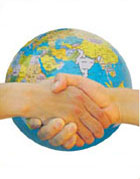 |
- It is normal to shake hands even for ladies. It is a common form of
greeting. It is also normal to shake hands while leaving. Shake hands with
everyone individually including children.
-
- Please introduce older people first, as it is a sign of respect.
- It is customary to stand when someone is being introduced to you.
- In some homes it is customary to kiss three times on alternating cheeks
(left, right, left) when greeting someone as well as bidding farewell. This
is a custom typically for people of the opposite sex, although some people
of the same sex do this as well.
|
 |
- Don't mix up your sign language: tapping your finger on the centre of the
forehead indicates someone is crazy, whereas tapping your finger on the side
of your head means someone is brilliant!
|
- English is spoken as a second language by many. On television many programmes
are in English with Dutch under titles. Many also speak German and French. Many
Surinamese speak and understand Hindi
|
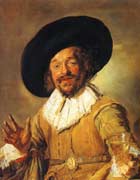 |
- When dining out do expect to "go Dutch". Unless you were invited to a
meal and the host told you that it was their treat, you should pay your
portion of the bill or expect the bill to be divided up evenly.
- When a baby is born “Beschuit met muisjes” is served. It is actually
round shaped toast with aniseeds.....blue for a boy, pink for a girl.
Sometimes you will see a stroke carrying a baby pasted to the window.
- The Dutch love to eat raw salted herrings with lots of raw onion. It
is a Dutch delicacy. The herring season starts in May. Once the fishing ships
arrive back from the sea and deliver the herrings to the market the Dutch
herring fever starts. The fish is cleaned; head removed and is ready to eat.
You pick the fish up by the tail and let it slide into your mouth gradually.
- Ignorance is not bliss. Being a "strict vegetarian" and eating cheese
may not go hand in hand. To produce cheese the manufacturers use rennet as
a coagulant. This is generally a veal by-product from calf's-intestine. But
many producers also use vegetarian rennet - microbial enzymes which are a
synthetically developed coagulant. If you are a vegetarian, before buying
make sure that that the cheese does not contain calf rennet.
- Remember many Dutch persons consider eggs as vegetrian dish.
- Many restaurants serve beans with becon and ham. When ordering make
sure that your vegetrian dish contains only vegatbles and becon and/or ham.
|
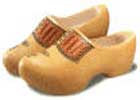 |
- Tipping is included in your bill. Don't feel obliged to leave a tip, but
rounding up the bill is always appreciated in taxis, restaurants, and pubs with
table service. Leave a tip if you feel that the service was good. For good
service you may want to leave a 10% tip.
|
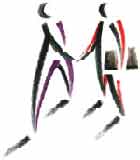 |
- Staring from the days of the Dutch East India Company (VOC), the Dutch
have a long history of doing International trade and are familiar with
doing business with foreigners. The Dutch take a long-term perspective
when looking at new business and business cooperation. Try to convince
your Dutch partners what your company may mean for their business and
future growth.
- The Dutch do business only by appointment. Schedule appointments in advance.
It is not correct business practice to cancel or attempt to reschedule
a meeting at the last minute.
- Normal business hours are from 8.30 a.m. to 5.30 p.m. For the Dutch
the month of July and August and December are holiday period. They usually
take extended holidays during these months.
- Be on time. Punctuality is important to business. The Dutch place great
importance on the efficient use of time.
- Don’t drop by a colleague's workplace for small talks.
- Meetings are conducted in the office. They are generally formal, well
structured and adhere to the agenda. Business meals are usually a break
from a meeting or to celebrate.
- Dutch organisations are generally flat. Dialogue between management
and staff is encouraged and seniors welcome input from subordinates.
Equality between genders is encouraged. Women officially have the same
opportunities in the work place as men. Don’t be surprised to find a woman
as your manager. Yet, natural gender biases still continue, limiting women’s
chance of reaching high managerial positions.
- Initially the Dutch are quite formal. But after first contact the Dutch
generally prefer a fairly personal approach addressing on the first name basis.
Address your Dutch business partner using formal titles and family names until
invited to do otherwise. Colleagues usually use first-names with each other.
- The Dutch generally maintain a clear separation between their personal and
business lives and will not spend a lot of time socialising at meetings or
other business discussions. The Dutch do not ask personal questions and will
refuse to answer should you try to intrude on their privacy. Personal life
is kept separate from business.
- Don’t blow your own horn about your own achievements or inflate your skills.
Dutch appreciate modesty.
- Never ask a Dutch person about his salary
- Expensive gifts should not be given to your business partners. It may make
your business partner uneasy as they feel they have to reciprocate at the same
level. Large gifts may also be interpreted as bribery.
- Facts, statistics and other hard data are greatly valued in Dutch business.
The Dutch prefer arguments based on rationality and not on emotions. Business
proposals should always be supported by facts and figures.
- The Dutch are very commercially oriented & would not spend any money on you
without a reason.
- There is a difference between the Netherlands and Holland. The Netherlands
is the country. Holland is a name in common usage given to a region in the western
part of the Netherlands. Though the name Holland is actually an area which includes
only two of the country’s twelve provinces, the name 'Holland' is often informally
used to refer to the whole of the country of the Netherlands.
|
 |
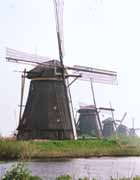 |
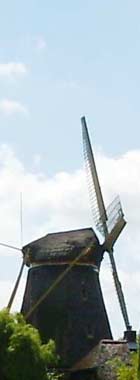 |
- Very often they are moody, don’t get shocked if on some day one of your
neighbours, (whom you consider as a good friend and very close too) does not
reply to your good morning. He can be occupied in his thoughts with something
else or something has happened at home.
- Dutch are very fond of going on vacation. Many of them get in their caravans
and head south to the Alps and the Mediterranean coasts.
- If you are living in a small community it is considered very peculiar to leave
your curtains drawn especially in the living room.
- In the public transport (bus, tram etc.) seats are reserved for older
people(65+) or invalids. The same is the case in parking places for invalid
person.
- The Dutch keep their doors closed both at home and in the workplace. Always
knock even when the door is slightly open and wait to be invited in before
entering someone’s room.
- Don't forget, football is a big sport in the Netherlands. During European
championship and world cup competitions, if the Dutch participate, then they go
crazy. Keeping a track of game statistics helps in picking up conversation with
a Dutch person. When Netherlands is playing everything becomes orange. They do
play also hockey, cricket, baseball, tennis, basketball, etc.
- 27th April is the king's birthday and is an official holiday. The 5th of May
is also an official holiday in the Netherlands. It is the day the Dutch celebrate
the liberation of their country and the end of the Second World War.
- On 5th of December the Dutch celebrate a unique feast of Sinterklaas or St.
Nicolas. It is celebrated by young and old, irrespective of religion. Sinterklaas
dressed in red robe, riding a white horse accompanied by his Zwarte Piet (Black Pete)
visits schools to distribute presents. On his birthday the Dutch drink hot chocolate
milk and eat speculaas (spiced biscuits). Gifts said to come from Sinterkaas are
exchanged on the evening before Saint Nicholas's Day. Tradition demands that all
packages be camouflaged in some imaginative way, and that every gift be accompanied
by a fitting poem. This is the essence of Sinterklaas: lots of fun on a day when
people are not only allowed, but expected, to make fun of each other in a friendly
way. On this day most places of business close a bit earlier than normal and the
Dutch head home to celebrate with their family.
- Another Dutch tradition is the eating of Oliebollen (a sort of doughnuts) on
December 31st. A New Year’s Eve without them would be unthinkable!
- It is not allowed to drink at public places. This means that you can’t drink
alcohol anywhere except in places like bars and discotheques.
- In contradiction to what most people think, drugs in the Netherlands are still
illegal.
- Smoking inside bars, restaurants and clubs was made illegal in July 2008. It
is also prohibited to smoke cigarettes indoors in public places. In many of the
student residences it is not allowed to smoke in the common areas. You will have
to go outside or into a special smoking area inside the location to smoke.
- By law it is also required to have your passport or European ID card with you
all the time. The police can ask you to show your identification.
- Prostitution, the oldest profession in the world in the Netherlands is legal
and regulated. They can openly advertise their services in newspapers and on the
internet. Prostitutes are treated as self-employed persons; street prostitution
is permissible in managed zones; brothels are legal but subject to licensing.
- Coffee shops sell more than coffee. Amsterdam and other Dutch cities are well
known for its cannabis trade. You might end up with more than you ordered if you
enter one of the many 'coffeeshops' with a simple coffee and biscuits in mind.
- Many shops are closed on Monday morning. Some open only after 13:00 hrs.
Shops close at six in the afternoon. Large supermarkets are open till 21:00 hrs.
Some supermarkets are open on Sundays also and this is announced in advance.
- Do say hello and goodbye to shopkeepers.
- It’s easy to find an ATM.
- A few cities like Rotterdam parking your car might be a problem as the
parking meters accepts only debit or credit cards. At some parking zones you
can pay through your mobile also.
- There are ample possibilities to make use of the Internet. Large cities have
Internet cafes.
- Mobile telecom coverage is excellent.
- In the Netherlands cycling is very common and popular method of transportation.
There are cycle-paths and segregated cycle facilities come in many forms, with their
own sets of rules and systems - including traffic signals tunnels and lanes. Be aware
of cycle theft! Especially in Amsterdam, Rotterdam, The Hague and Utrecht are notorious
for it. Bicycles can be hired for the day in almost all the cities and towns. But
before you jump on to the bicycle, please get orientated with the Dutch rules and
regulations’ and check your insurance policy for coverage in the unlikely event you
meet with an accident.
- Please note that not all people looking like Indians in the Netherlands are from
India. They are PIOs from Suriname in South America which was a Dutch colony. Many
of them migrated from Suriname to the Netherlands.
|
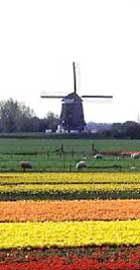 |
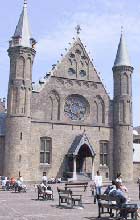 |
















